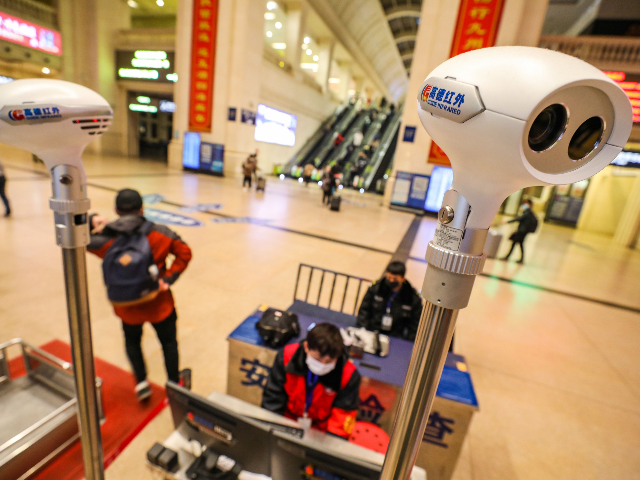Communist China’s government is growing increasingly uneasy about the Wuhan virus, an outbreak the Chinese have been accused of covering up until the infections and fatalities became impossible to deny.
On Tuesday, the Central Political and Legal Affairs Commission in Beijing wrote a social media post threatening that “anyone who deliberately delays and hides the reporting of cases out of his or her own self-interest will be nailed on the pillar of shame for eternity.”
“Anyone who puts the face of politicians before the interests of the people will be the sinner of a millennium to the party and the people,” the post continued, warning that government officials will “only provide a breeding ground for rumours to grow if we keep [the public] in the dark and strip them of their right to the truth.”
The South China Morning Post saw the heated warning from Beijing’s nominal supreme government watchdog agency as an effort by the Chinese government to reclaim some credibility after downplaying the Wuhan virus outbreak for so long. According to the report:
The outbreak, which had infected more than 300 people across China and around half a dozen overseas by Tuesday evening, apparently originated from a seafood market. So far, at least six people in Wuhan have died because of the virus.
It is believed to be less contagious than severe acute respiratory syndrome, which killed more than 700 people worldwide.
But China’s poor handling of that outbreak in 2002 and 2003 – which was marked by cover-ups and an official reluctance to share information – has prompted skeptics to ask whether Beijing would again put politics ahead of protecting public health.
Peter Cordingley, who was the spokesman for the World Health Organization during the Sars crisis, was one of those who raised the alarm on social media on Tuesday accusing Beijing of “lying about the spread of the Wuhan flu virus from the start.”
“I say this because I was the WHO spokesman in Asia at the time of the 2003 Sars outbreak, and I’m seeing precisely the same reckless behavior now,” he wrote.
The Chinese Foreign Ministry insisted it has handled the Wuhan outbreak with a “responsible attitude,” while Chinese state media fingered local officials as scapegoats for recognizing the threat too slowly.
Skeptical observers, not all of them outside China, said the slow response could have been an innate problem with Chinese bureaucracy, from the lack of initiative displayed by lower-ranking officials terrified of getting blamed for bad decisions to China’s totalitarian speech controls, which make information-sharing difficult. Stated simply, everyone further down on the totem pole was waiting to find out how Chinese dictator Xi Jinping wanted to handle the crisis, and whether he even wanted to admit there was a crisis.
The Chinese public, having grown sadly accustomed to medical scandals over the past few years, demonstrated its lack of confidence in Beijing’s reassurances by buying up a huge quantity of surgical masks. The stock prices of Chinese face mask manufacturing companies are surging, along with stocks in pharmaceutical companies. The market response to public demand for protection from the Wuhan virus has been so strong that conspiracy theorists are musing online that the bug might have been deliberately engineered and released by Chinese Big Pharma to drum up business.
Cases of the Wuhan virus have now been reported in South Korea, Japan, Thailand, and most recently Taiwan, which confirmed its first case on Tuesday. The Taiwanese victim is a woman who just returned from working in Wuhan.
Also on Tuesday, a South Korean budget airline called T’way Air announced it was postponing the planned launch of service to Wuhan because of the outbreak. South Korea’s first case of the Wuhan virus was confirmed on Monday. Numerous countries, including the United States, have implemented enhanced medical screening for airline passengers from Wuhan.
Epidemiologists are worried the contagion could be spread by travelers during the Lunar New Year season. Some international medical experts are worried the existing number of infections could be much higher than the Chinese government is willing to admit.
The World Health Organization will hold an emergency meeting on Wednesday to consider declaring an international public health emergency now that Chinese doctors have confirmed human-to-human transmission of the virus, which was formerly thought to spread through contaminated seafood and contact with animals.
Epidemiologists are particularly concerned that China has downplayed the ease of human-to-human transmission, fearing the Wuhan virus could become a “super-spreader” that infects medical personnel and spreads to other people they are treating. If WHO declares a public health emergency for the Wuhan virus, it will become only the third such alert currently in effect, the other two being Ebola in the Congo and the ongoing effort to eradicate polio.

COMMENTS
Please let us know if you're having issues with commenting.